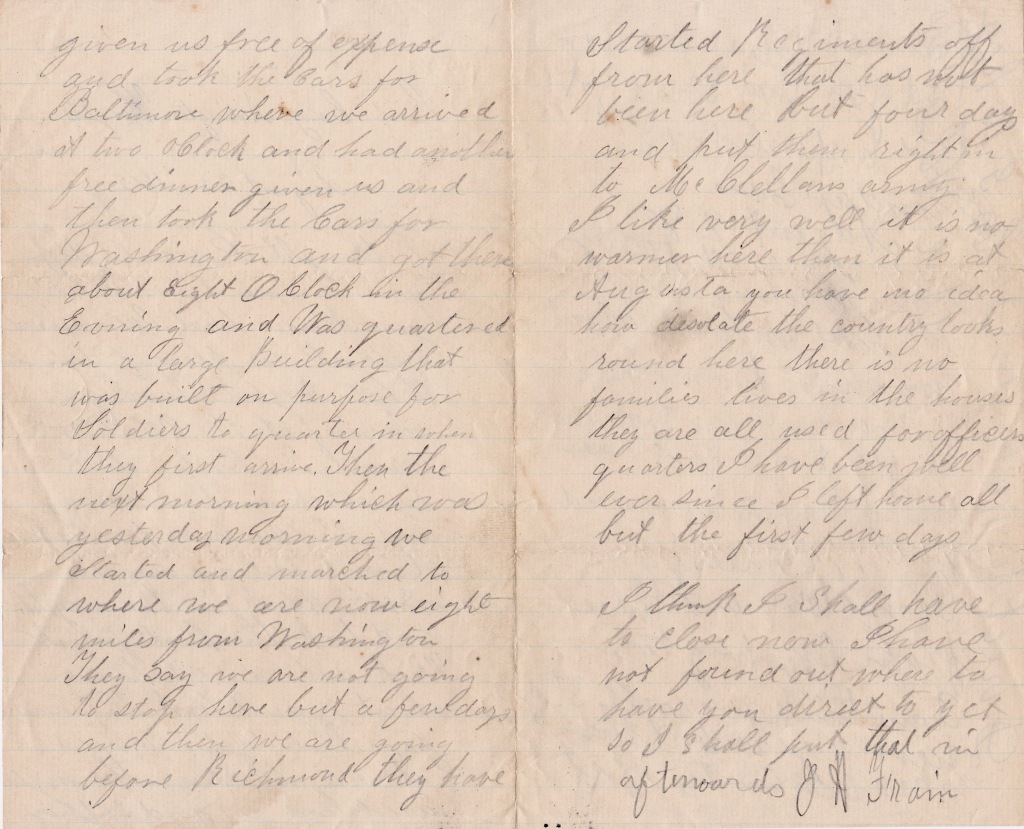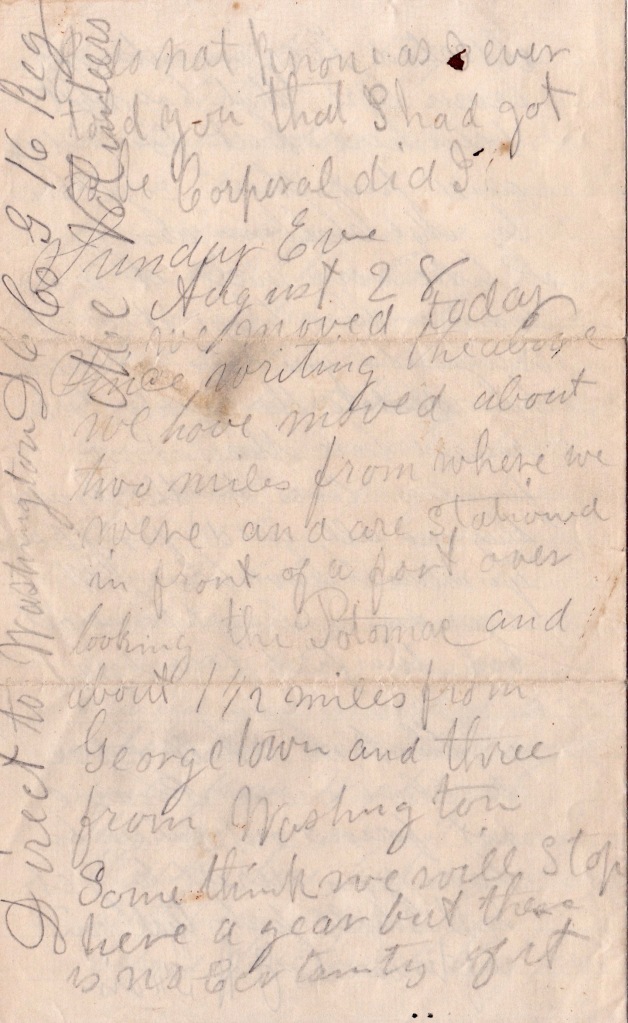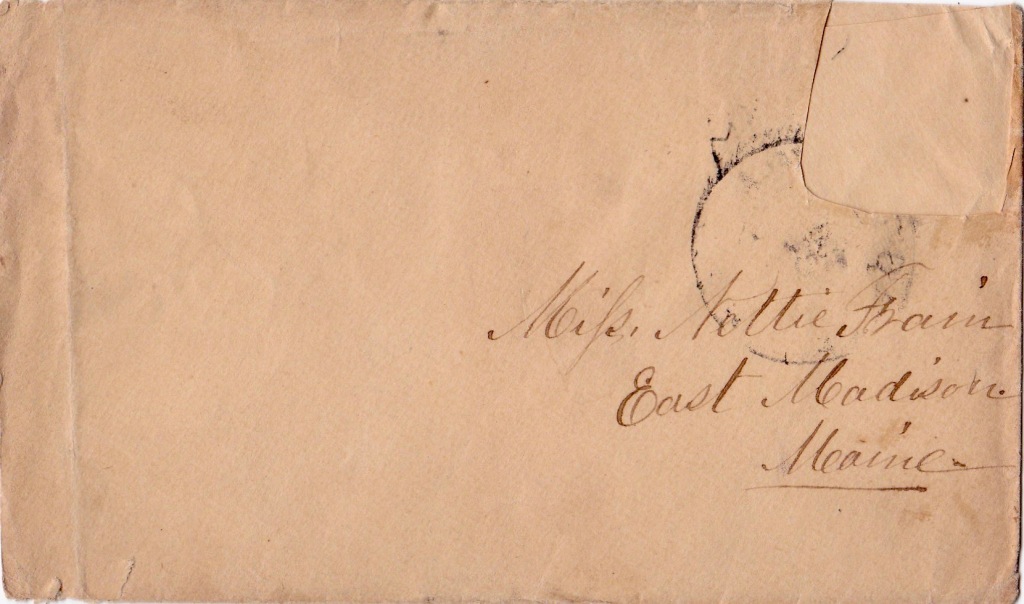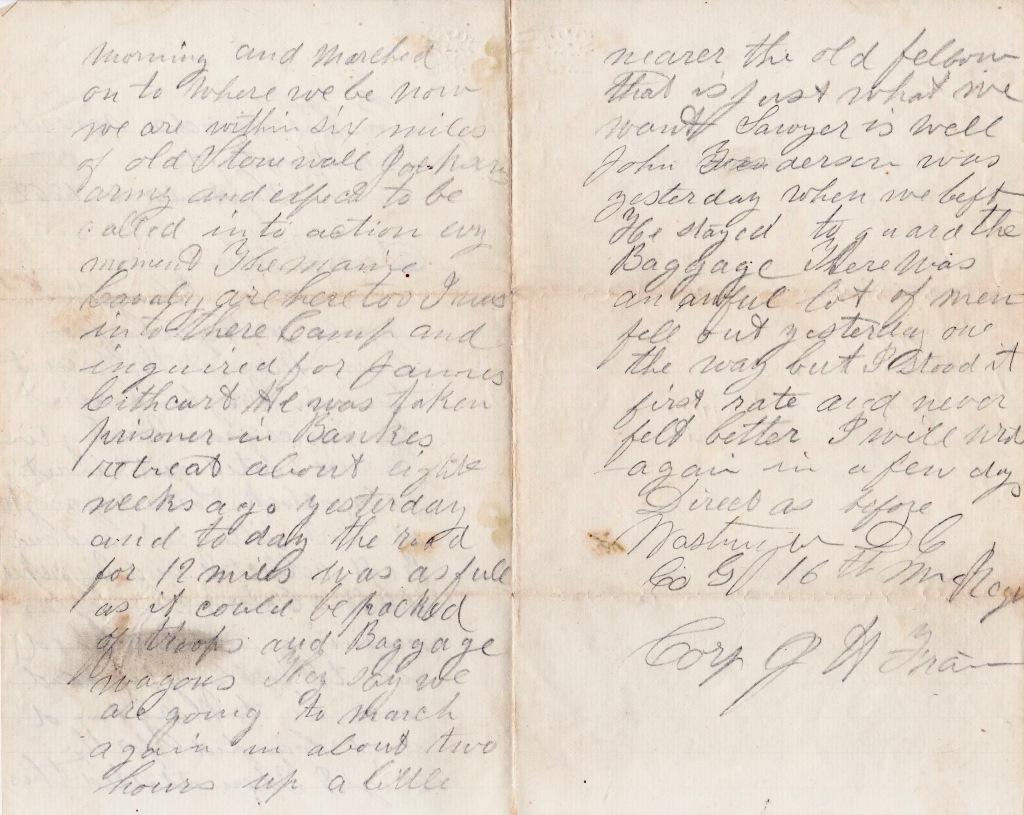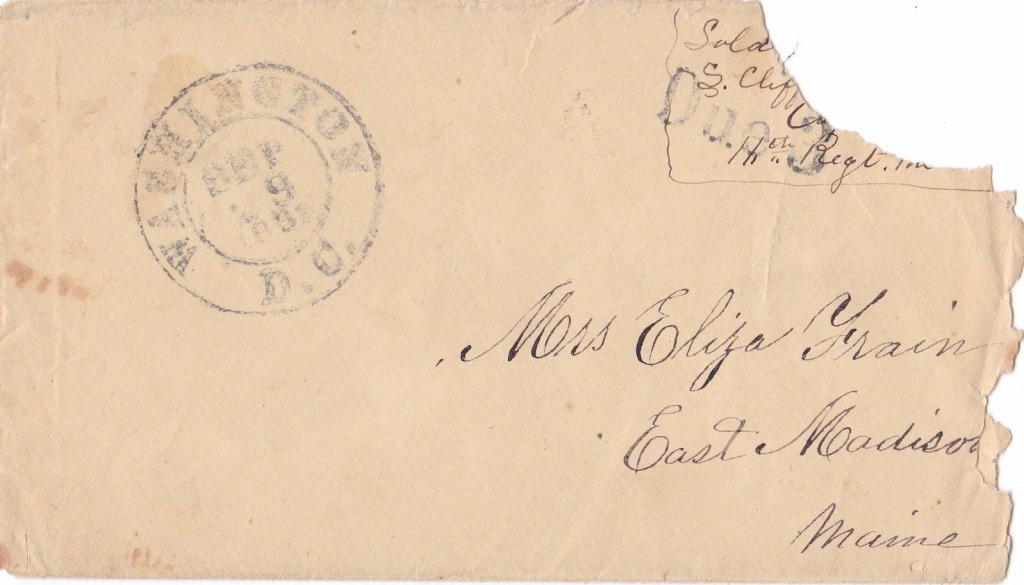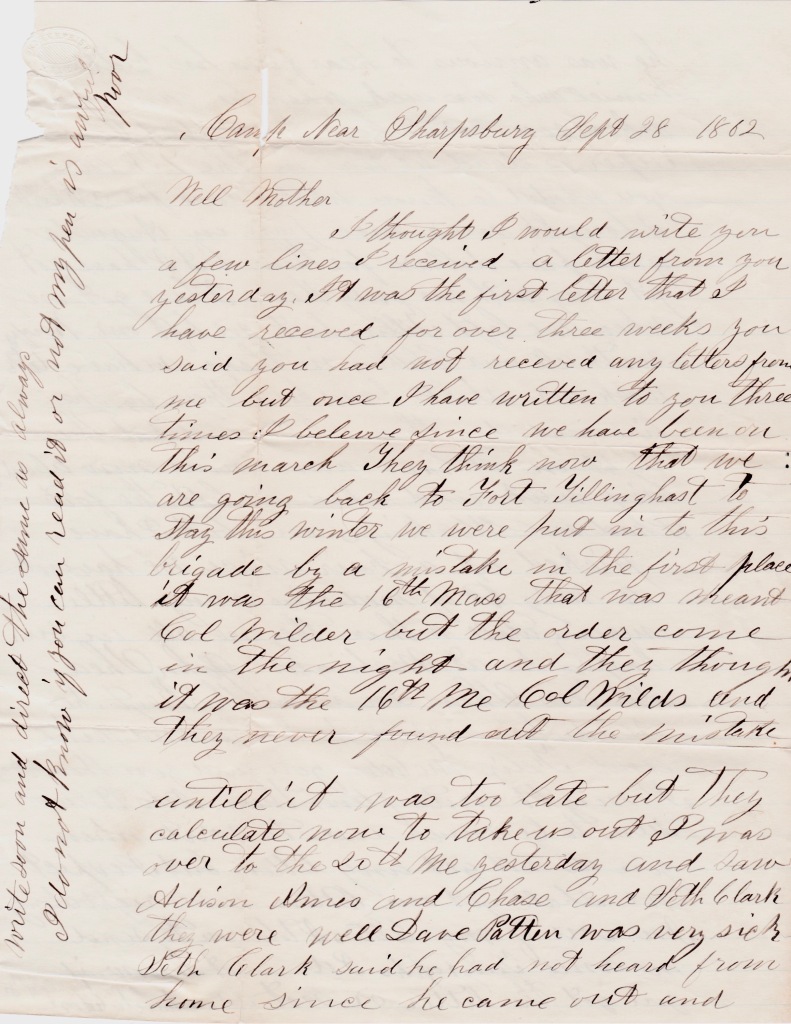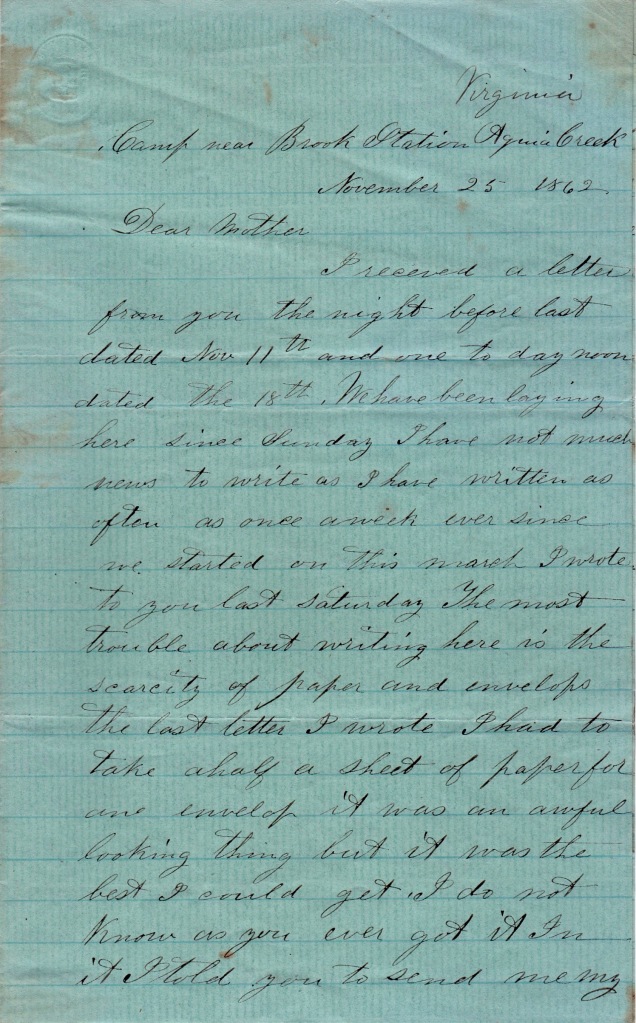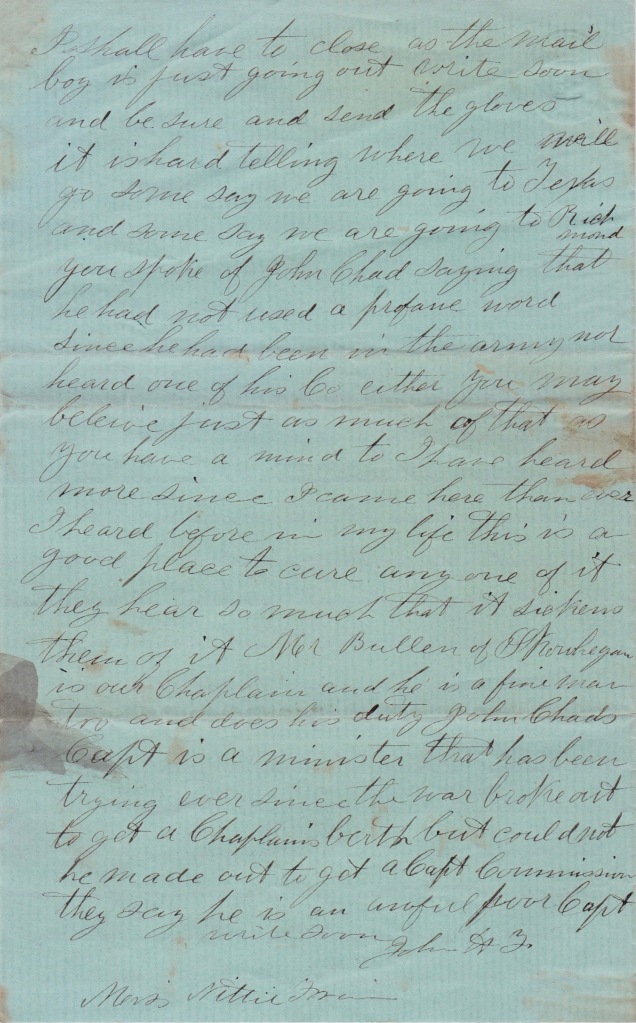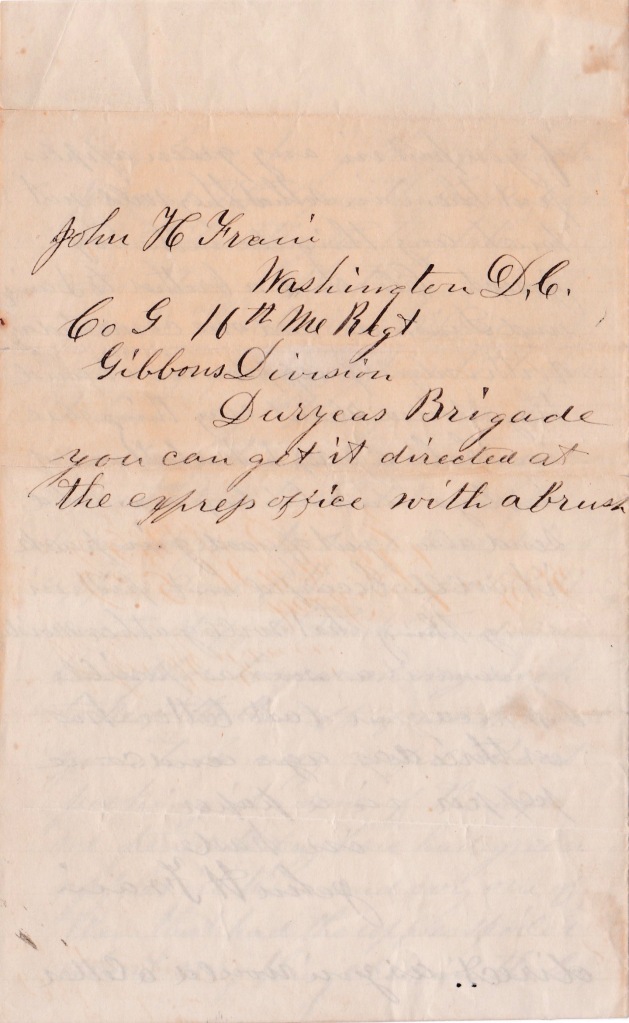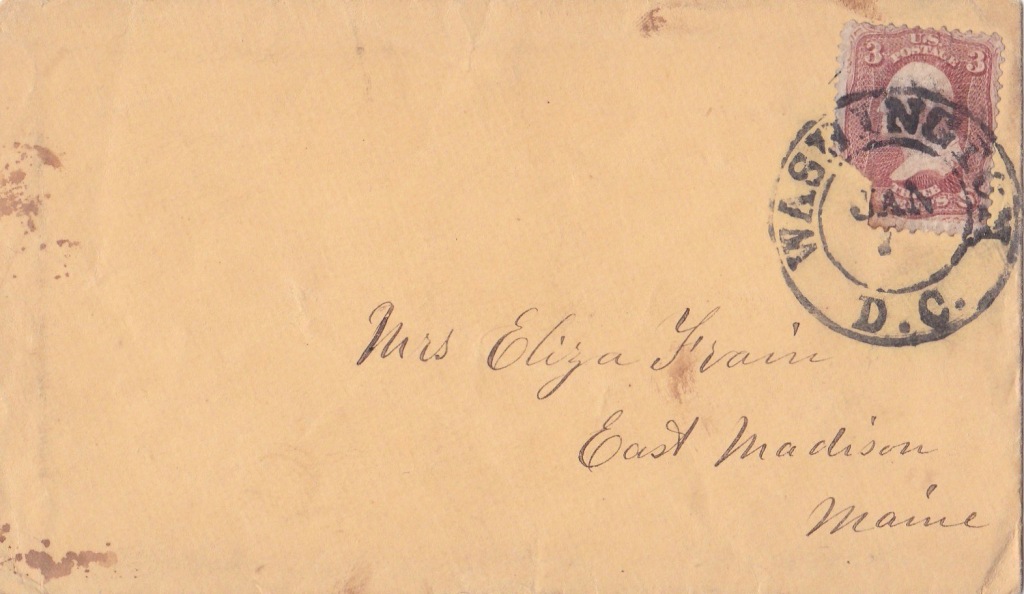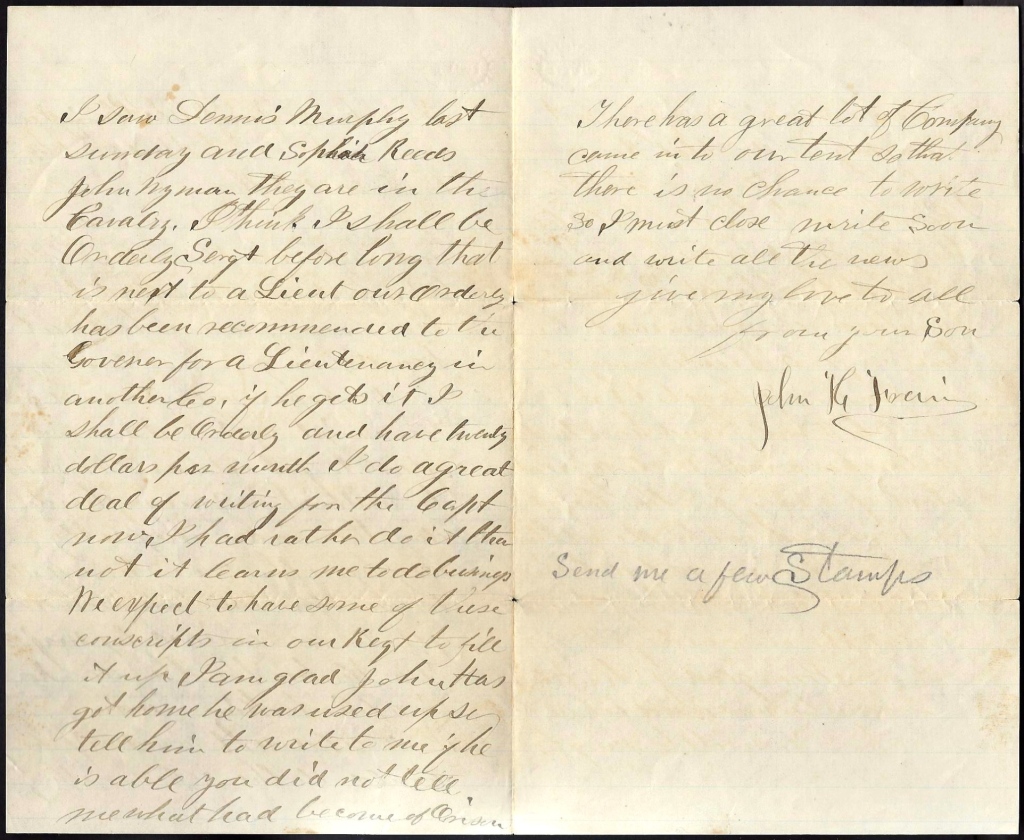
These letters were written by John H. Frain (1840-1898) who enlisted on 15 August 1862 in Co. G, 16th Maine Infantry. He rose in the ranks from private to 2nd Lieutenant while in the service of his country.
John was taken prisoner in the railroad cut during the fighting on the first day at Gettysburg while covering the retreat of Doubleday’s Division from Oak Ridge west of town [see 16th Maine Regiment’s heroic stand]. He was taken prisoner again on 19 August 1864 at Weldon Railroad near Petersburg, just days after the last letter in this collection was penned.
John was the son of Moses Fraine (1807-1894) and his wife Eliza Cunningham (1817-1893) of Madison, Somerset County, Maine. Moses was a shoe or boot maker from England; Eliza was a native of Ireland. After the war, John married (1868) Pauline F. Richardson (1848-1896) and settled in Skowhegan where he worked at a livery stable.
Though military records and John’s signature use the spelling “Frain,” I have used “Fraine” on this brief biographical sketch since that it the way it is spelled on the family headstones.
[Note: These letters (with the exception of Letter 6) are from the personal collection of Jim Doncaster and are published by express consent.]
Letter 1
Camp Casey
Arlington Heights
August 23, 1862
I thought I would drop you a few lines to let you know that we arrived safe at our place of destination.
We left Augusta Tuesday morning at 7:30 o’clock and arrived in Boston about six o’clock in the evening and shifted cars for Fall River where we arrived about 1 o’clock in the night and took the boat for New York and arrived there about 5 and took the cars for Philadelphia. arrived at one o’clock in the night and had a good supper given us free of expense and took the cars for Baltimore where we arrived at two o’clock and had another free dinner given us and then took the cars for Washington and got there about eight o’clock in the evening and was quartered in a large building that was built on purpose for soldiers to quarter in when they first arrive.
Then the next morning which was yesterday morning, we started and marched to where we are now—eight miles from Washington. They say we are not going to stop here but a few days and then we are going before Richmond. They have started regiments off from here but four days and put them right on to McClellan’s Army.
I like [it] very well. It is no warmer here than it is at Augusta. You have no idea how desolate the country looks round here. There is no families lives in the houses. they are all used for officers quarters. I have been well ever since I left home—all but the first few days.
I think I shall have to close now. I have not found out where to have you direct to yet so I shall put that in afterwards. — J. H. Fraine
I do not know as I ever told you that I had got to be corporal, did I?
Sunday eve., August 28. We moved today. Since writing the above, we moved about two miles from where we were and are stationed in front of a fort overlooking the Potomac and about one and a half miles from Georgetown and three from Washington. Some think we will stop here a year but there is no certainty of it.
Direct to Washington D. C., Co. G, 16th Regt. Maine Volunteers
Letter 2
In the woods somewhere in Maryland
September 8, 1862
Dear Mother,
I thought I would write you a few lines. We are at the present time in Maryland about ten miles from Washington. We were routed out about 10:30 o’clock Saturday night at Fort Tillinghast and our regiment collected and marched about 3 o’clock Sunday morning and marched into Washington and over into Maryland and camped for the night. Then started this morning and marched on to where we be now. We are within six miles of Old Stonewall Jackson’s army and expect to be called into action any moment.
The Maine cavalry are here too, I was in their camp and inquired for James Cithcart. He was taken prisoner in Banks’ retreat about eight weeks ago yesterday. And today the road for 12 miles was awful as it could be—packed of troops and baggage wagons. They say we are going to march again in about two hours up a little nearer the old fellow. That is just what we want.
[Thomas D.] Sawyer is well. John [H.] Fenderson was yesterday when we left. He stayed to guard the baggage. There was an awful lot of men fell out yesterday on the way but I stood it first rate and never felt better. I will write again in a few days. Direct as before.
Washington D. C., Co. G, 16th Maine Regt., Corp. J. H. Fraine
Letter 3
Camp near Sharpsburg [Maryland]
September 28, 1862
Well Mother, I thought I would write you a few lines. I received a letter from you yesterday. It was the first letter that I have received for over three weeks. You said you had not received any letters from me but once. I have written to you three times I believe since we have been on this march. They think now that we are going back to Fort Tillinghast to stay this winter. We were put into this brigade by mistake in the first place. It was the 16th Massachusetts that was meant [lead by] Col. Wilder. But the order came in the night and they thought it was the 16th Me., Col. Wilds, and they never found out the mistake until it was too late. But they calculate now to take us out.
I was over to the 20th Maine yesterday and saw Addison Ames 1 and Chase and Seth Clark. 2 They were well. Dave Patten 3 was very sick. Seth Clark said he had not heard from home since he came out and he was anxious to hear from his brother Daniel who was sick when he came away/ When you write, [tell me] how he is.
And Orrin Piper is dead. He was in the 7th Maine. 4
You wanted to know what I done for a shirt. I bought me a nice pair in Augusta. Gave five dollars for them but I have not got any with me—only the one I have got on. When we left Tillinghast, we left our knapsacks with all our clothing in them. We have to wash our shirts and hold them by the fire and dry them a little and put them right on. I have worn mine now about six weeks and when we left the fort I had no stockings on but I have picked up a pair since. We haven’t a might of medicine or any little necessary atall with us. They are all in our knapsacks at Washington.
John Shea—old Tom Shea’s son—is in this regiment. 5 He send his respects to Father and Mike and Felix McColer. You said you thought I might write oftener that I do. It don’t seem to be much use to write when you do not get any letters but I expect we shall get our letters now right along. In one of my letters I told you to send me some telegraphs. I do not know if you got the letter or not. I shall have to close. — J. H. F.
Write soon and direct the same as always. I do not know if you can read it or not. My pen is awful poor.
1 Addison M. Ames (1828-1903) of Cornville, Somerset county, Maine, served in Co. D, 20th Maine Infantry. He was wounded in the arm at Gettysburg, presumably in the defense of Little Round Top. He received a second wound while fighting in the Wilderness on 5 May 1864.
2 Seth W. Clark (1829-1862) of Solon, Somerset county, Maine, served in Co. F, 20th Maine Infantry. He was killed at Gettysburg in the defense of Little Round Top on July 2, 1863.
3 David Patten of Cornville, Somerset county, Maine, served in Co. F, 20th Maine Infantry. He was wounded in the arm and side at Gettysburg, presumably in the defense of Little Round Top.
4 Orrin Piper of Co. F, 7th Maine Infantry died of Phthisis Pulmonalis on 2 September 1862 at Hammond General Hospital at Lookout, Maryland. He was buried at Arlington National Cemetery, Grave 12342. Orrin was from Monson, Piscataquis county, Maine, and was married to Jane D. Ames in 1846. The couple had five children.
5 John Shea, at age 36, enlisted as a musician in Co. G, 16th Maine Infantry. He was later promoted to principal musician in the regiment. He was from Anson, Maine.
Letter 4
Camp near Brooks Station, Aquia Creek, Virginia
November 25, 1862
Dear Mother,
I received a letter from you the night before last dated November 11th and one today noon dated the 18th. We have been laying here since Sunday. I have not had much news to write as I have written as often as once a week ever since we started on this march. I wrote to you last Saturday.
The most trouble about writing here is the scarcity of paper and envelopes. The last letter I wrote I had to take a half a sheet of paper for one envelope. It was an awful looking thing but it was the best I could get. I do not know as you ever got it. In it I told you to send me my bucksjin gloves done up as you would paper. You will have to pay about fifteen cents on them in order to have them come. Ever so many of the boys in our company have had them come in that way. In the same letter I told you to put in a sheet or two of paper and envelope in every letter. You can send it as well as not. I had to give two stamps for this sheet and an envelope. I have received stamps from home three times which is all you sent.
So you said I wrote for Father to make me a pair of boots and keep them until I sent for them which I am in hopes to before long. I want a pair of long-legged ones, thick-soled, and tapped & nailed in good shape. And I want you to get some grey flannel and make me a pair of shirts and keep them until I send for them. I had not dare to have anything sent now while we are on the march but I am in hopes that we will get somewhere by and by where we will stop long enough to have them come.
I have received papers occasionally but have not got any for about ten days. I wish you would send me a good story paper once in awhile. It seems so good to pass away time. I never knew the want of money before but I am not as hard up as [Thomas] Sawyer. He had a nice watch that cost him twenty dollars in Augusta and he has fooled it away for about nine to get money. I have one worth twenty-five dollars and I am bound to hang [on] to it as long as I can. If you can. You may send me a dollar or two to keep me along until pay day.
I shall have to close as the mail boy is just going out. Write soon and be sure and send the gloves. It is hard telling where we will go. Some say we are going to Texas and some say we are going to Richmond.
You spoke of John Chad saying that he had not used a profane word since he had been in the army—not heard one of his company either. You may believe just as much of that as you have a mind to. I have heard more since I came here than ever I heard before in my life. This is a good place to cure anyone of it. They hear so much that it sickens them of it.
Mr. [George] Bullen of Skowegan is our Chaplain and he is a fine man too and does his duty. John Chad’s Captain is a minister that has been trying ever since the war broke out to get a chaplain’s berth but could not. He made out to get a captain’s commission. They say he is an awful poor captain.
write soon, — John H. F.
Letter 5
Camp near Falmouth, Va.
January 1, 1863
Well Father, Mother, Sisters, Brother and everybody else in East Madison, I wish you all a Happy New Year. We are at the same place where we have been for some time. We are expecting to go in to winter quarters every day.
The boxes for our regiment came up today. [Thomas D.] Sawyer’s 1 came but John [H.] Fenderson’s did not. All the wounded mens’ boxes were opened by the Captain and sold and the money will be sent to them. But the dead mens’ were not opened. They have to go through a certain process of law before they can open them. When they do, they take an inventory of the things and it goes to their heirs so I have not got my gloves yet. I wrote to you to have my things ready to send any time. I am ready now. In addition to what I sent for, I want you to send some dried apples, some of this composition this warm stuff to drink, and some camphor to wear on my neck to keep the lice off of me. I want you to be very careful about packing it. Some of the boxes we opened today here had green apples in them and every one of the that had the apples spoiled about everything else in the box. If you put in any green apples, put them in so that they will not touch anything else in the box.
Joseph Cleveland, a brother to Davis and Dinsmore had one come today with only six apples in it and they spoiled about everything else in the box. Joseph has lost one of his legs and his box was sold. 2
Send also 1 gut of good gin. Pack it well. Be careful not to put in anything that will gather moisture. Send it as soon as possible.
I received your last letter two or three days ago and some pepper in a paper. In haste.
—John H. Fraine
Direct as you would a letter.
John H. Frain
Washington D. C.
Co. G, 16th Maine Regiment
Gibbon’s Division
Duryeas Brigade
You can get it directed at the Express Office with a brush.
1 Thomas D. Sawyer of New Sharon, Maine,, was 39 years old when he enlisted on 14 August 1862. He died on 2 December 1862.
2 Joseph L. Cleveland of Skowhegan, Maine, was 27 years old when he enlisted on 14 August 1862 in Co. G, 16th Maine Infantry. He was wounded on 13 December 1862 at the Battle of Fredericksburg, had his leg amputated, and died of his wounds on 31 December 1862.
Letter 6
Camp near Belle Plains, Virginia
April 5th, 1863
Dear Mother,
I received yours and Nettie’s and Walter’s letter last night and was glad to hear from you as I had not heard from you for ten days. Also two papers — a Farmer and a Transcript which I was very glad to get.
I have no news to write. It is snowing hard today. The roads were pretty dry before this snow. We expected to move before this but have not yet. We were reviewed by Maj. Gen. Hooker the other day — he is a fine looking man. I would not wonder if he would do the rebs something.
I saw Dennis Murphy last Sunday and Sophia Reed’s John Wyman. They are in the cavalry. I think I shall be orderly sergeant before long. That is next to a lieutenant. Our orderly has been recommended to the Governor for a lieutenancy in another company. If he gets it, I shall be orderly and have twenty dollars per month. I do a great deal of writing for the captain now. I had rather do it than not. It learns me to do business.
We expect to have some of the conscripts in our regiment to fill it up. I am glad John has got home. He was used up so. Tell him to write to me if he is able. You did not tell me what had become of Orison.
There was a great lot of company came in our tent so that there is no chance to write so I must close. Write soon and write all the news. Give my love to all. From your son, — John H. Fraine
Send me a few stamps.
Letter 7
Camp near White Oak Church, Virginia
Sunday, May 24, 1863
Well Sis, I received your letter of May 17th last night and was very glad to hear from you. I believe you do not write as often as you used to. I received the stamps also which was very acceptable.
As for news, I do not get any. We still lay where we were when I wrote last—about three miles from our old winter quarters. the most of folks think that there will not be any more fighting before September as so many of the two years and nine months regiments have goe home and a great many more going every day.
The weather is very warm here now. I will give you a little idea of what we have to do here everyday. Reveille or roll call at daylight, which is at 4 o’clock. Then [we] get our breakfast. Then drill from 6 to 8. Then another drill from 10 to 11, and another one from 4 to 6, and then dress parade which occupies about three quarters of an hour, making about 6 hours of drill a day which is pretty hard this warm weather. And a regiment inspection every Sunday of our guns and equipments and clothing and quarters and finally everything that a soldier has that comes off.
Today I am writing for it is noon while I write. You said you had a dance May night. I would not mind being there myself and see some of the girls as we do not see one very often excepting darkeys.
Well Nellie, I do not see but I shall have to close for want of anything to write. It is just like Sunday at home. It is so warm that everyone is off in the woods or in their tents. Although it is Sunday, a person could go out into the woods and find a hundred gambling away at a great rate. You will see four playing with a hundred or two dollars on the board and think nothing of it.
I will close now. Write me all the news and give my love to all that enquires for me. If they give any more furloughs, I shall try for one.
From your brother, — John H. Fraine
Letter 8
Camp of the 16th Maine Vols.
Before Petersburg, [Virginia]
August 14, [1864]
Dear Mother,
I received your letter the day before yesterday and was very glad to hear from you. I had not heard before for over two weeks and I wrote to you two or three times during the time. I think Walter might write once a week at least. I received six stamps in this last letter and received two papers at the same time.
I do not seem to gain very fast but keep round and do what I have to do. I have just one year from today to serve as we was mustered in to the U .S. Service on the 14th of August 1862.
Everything in our front is very quiet—only a little shelling nights. Sometimes we have to turn out five or six times in a night. They cannot get one into our camp, our breastworks are so high, but they will get some of them in pretty low—as low as the tops of our tents.
We have been expecting to be paid for the last month but have not yet. Part of our brigade have been paid already. I suppose business is rather dull in East Madison this summer and some of them are kind of looking two ways for Sunday on account of the draft. It will not be log till it comes off. I had about as leave be in my place as theirs when that comes off.
I will close now. I want you to write oftener than you do. Let Walter. There is nothing to hinder him writing.
Yours in haste, — John H. Fraine


